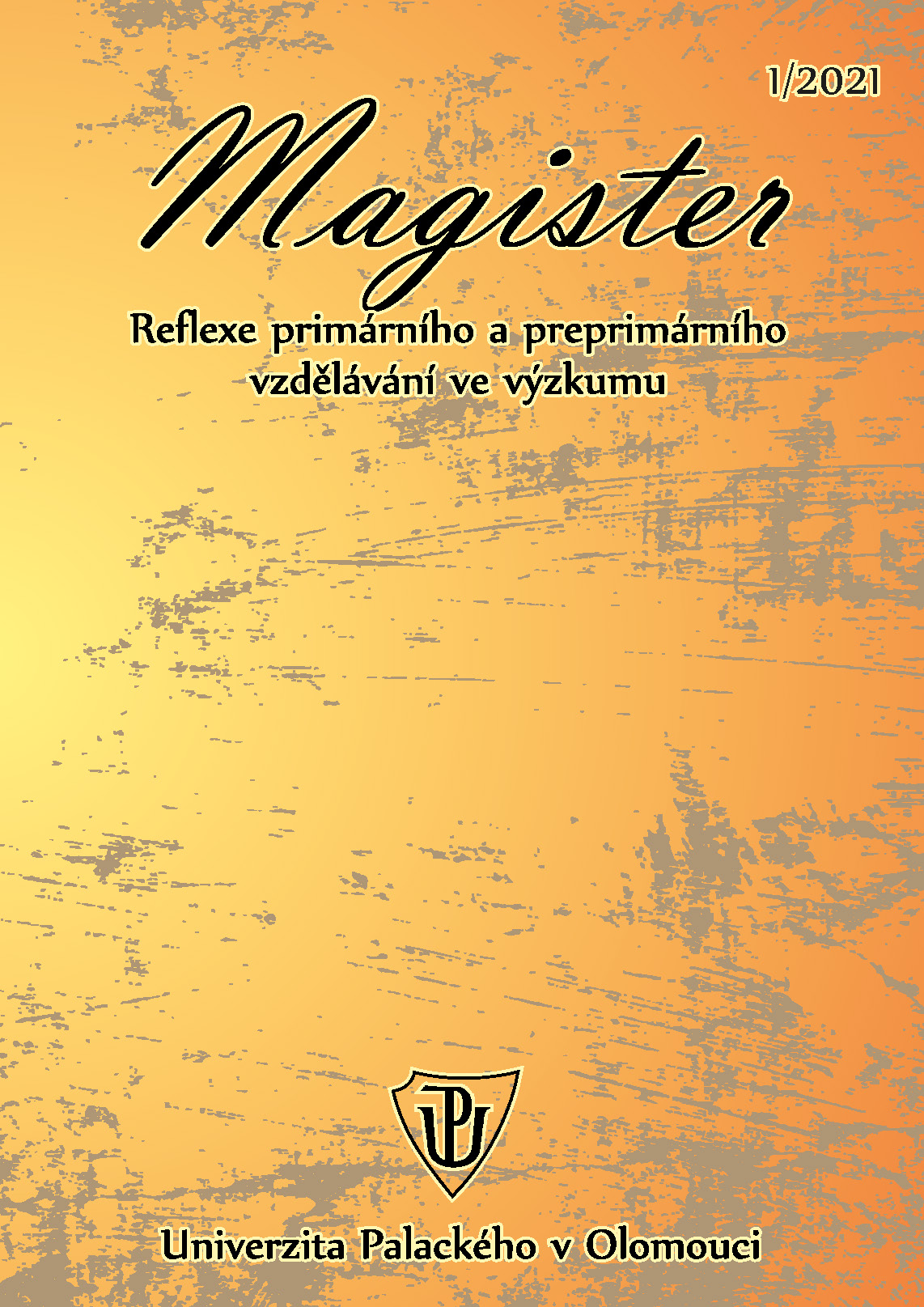Promoting prosocial communication in a private elementary school through an activating teaching method
DOI:
https://doi.org/10.5507/magister.2021.137Keywords:
Primary education, Democratic style, Prosociality, Ethical educationAbstract
This case study focuses on the teaching activity of a school assembly to understand the tools for teaching prosocial communication in school in the context of teachers' teaching strategies. Data collected through semi-structured individual interviews with four teachers were subjected to content analysis of the teaching artifacts. The segmented data were analyzed with the intention of comparing the congruence of teachers' strategies with the implemented teaching. The narrative analysis of the interviews resulted in the identification of the benefits of the teaching activity for the students in terms of teaching ethics education. It is a space for peer learning and strengthening social relationships, a space for practicing self-assessment and last but not least a space for practicing expressing emotions. Teachers also find the assembly activity beneficial for themselves. It helps them to perceive the school as a whole when they see the connections between events. Teacher support for the acquisition of prosocial communication clearly congruent with teachers' teaching strategies. The strategies are based on the shared values that the pupils learn in the classroom and in the school assembly. The strategies capture part of the hidden curriculum of the school by personal example to intervene in pupils' relationships and transform the content of the horizontal hidden curriculum. Finally, it is discussed the importance of the hidden curriculum experience.
References
ARISTOTELES. Etika Nikomachova [Jan Laichter, 1937]. V Praze: Jan Laichter, 1937. XXI, 305 s.
ČESKÁ ŠKOLNÍ INSPEKCE, 2016. Tematická zpráva – Etická výchova v předškolním, základním a středním vzdělávání: Praha. [cit. 17. 4. 2021]. Dostupné z: https://www.csicr.cz/Csicr/media/Prilohy/PDF_el._publikace/Tematick%C3%A9%20zpr%C3%A1vy/2016_TZ_eticka_vychova.pdf
BRESTOVANSKÝ, M., SÁDOVSKÁ, A., PODMANICKÝ, I., & KUSÝ, P., 2015. Charakteristiky hodnotenia a sebahodnotenia prosociálneho správania u žiakov piatych a šiestych ročníkov vybraných základných škôl. Studia Paedagogica (20)1, 67s.
FRIDRICHOVÁ, P., 2009. Kurikulum etickej výchova v primárnom vzdelávaní. In : Ligas, Š. Ed: Mravná výchova v školách na Slovensku a v zahraničí. Banská Bystrica: PF UMB v Banskej Bystrici, 44-54 s. FRIDRICHOVÁ, P 2007. Kurikulum etickej výchovy v primárnom vzdelávaní v Slovenskej republike. In Janík, T.; Knecht, P.; Najvarová, V. (ed.). Příspěvky k tvorbě a výzkumu kurikula. Brno: Paido, s. 93-
GAVORA, P. 2002. Rozhodnutie stať sa učiteľom - pohľad kvalitatívneho výskumu. Pedagogická revue, 54, 2002, č. 3, s. 240-256.
GOLEMAN, D. 2011 Emoční inteligence. Praha: Metafora. ISBN 978-80-7359-334-6
HOLEČEK, V. 2014. Psychologie v učitelské praxi. Praha: Grada Publishing,. ISBN 978-80- 247-3704-1.
HRABAL, V., PAVELKOVÁ, I. 2010. Jaký jsem učitel. Praha : Portál.
KERN, H. Přehled psychologie. Praha: Portál, 2000.
KOPŘIVA, P., 1999. Komunitní kruh a škola. Ratolest: časopis na podporu zdraví v našich základních a mateřských školách. Kroměříž: Spirála -iniciativa na podporu zdraví a rozvoje osobnosti, 14-15s. ISSN 1210-6216.
LENC, L. 1999. Etická výchova I., s. 6. Dostupné z: http://www.etickeforumcr.cz/eticka-vychova
MLČÁK, Z., ZÁŠKODNÁ, H. 2006. Analysis of relationship among prosocial tendencies, empathy and five-factor model of personality in students of helping disciplines. Kontakt, vol. 8, iss. 2, p. 316-328.
MOTYČKA, P., 2013. Implementace doplňujícího vzdělávacího oboru Etická výchova v České republice. Pedagogická fakulta, UK: Praha
NELEŠOVSKÁ, Alena. 2010. Primární a preprimární pedagogika v teorii, praxi a výzkumu. Olomouc: Altyn. s. 6. ISBN 978-80-87224-08-3.
PODMANICKÝ, I., RAJSKÝ, A. 2016. Človek človeku. K prameňom etickej výchovy. Trnava: Typi Universitatis Tyrnaviensis
RAJSKÝ, A. 2019. Love as absolute challenge – Also for education. Kultura i Wychowanie. 2. 89-98.
ROCHE, R., O., 1992. Etická výchova. 1. vyd. Bratislava: Orbis Pictus Istropolitana.
ROCHE, R. O. 2003. Rozvoj prosociální inteligence. Základní program pro zvýšení míry prosociálnosti. Celostátní seminář Etická výchova, Kroměříž, 14.-16. listopadu 2003.
ROCHE, R. O. 2005. Prosociálnost jako princip účinného projektu etické výchovy dětí a mládeže. Výňatek z přednášek roku 2003. In Kolektiv autorů. Na cestě s etickou výchovou. Sborník přednášek semináře S etickou výchovou do sjednocené Evropy, Kroměříž 2004. Praha: Luxpress.
STARÁ, J., STARÝ, K. 2018. Výukové cíle aneb cesta tam a zase zpátky. Pedagogika, 68(2), 107–129.
STOLINSKÁ. D. Podpora inkluze v mateřských školách rozvojem prosociálního chování dětí v předškolního věku. Olomouc: Magister, reflexe primárního a preprimárního vzdělávání ve výzkumu 2/2019, s. 85 - 94, e-ISSN 2571-1342.
SVOBODOVÁ, Z. 2011. Etická výchova jako cesta z omezené každodennosti. In: Svobodová, Zuzana. (ed.). K etické výchově. Praha: Karez, ISBN 978-80- 905117-0-5.
VANĚK, D. 2011. Rozvoj prosociálního chování u žáků II. stupně základní školy v kontextu Etické výchovy. Masarykova univerzita v Brně.
Downloads
Published
Issue
Section
License

This work is licensed under a Creative Commons Attribution-ShareAlike 4.0 International License.


